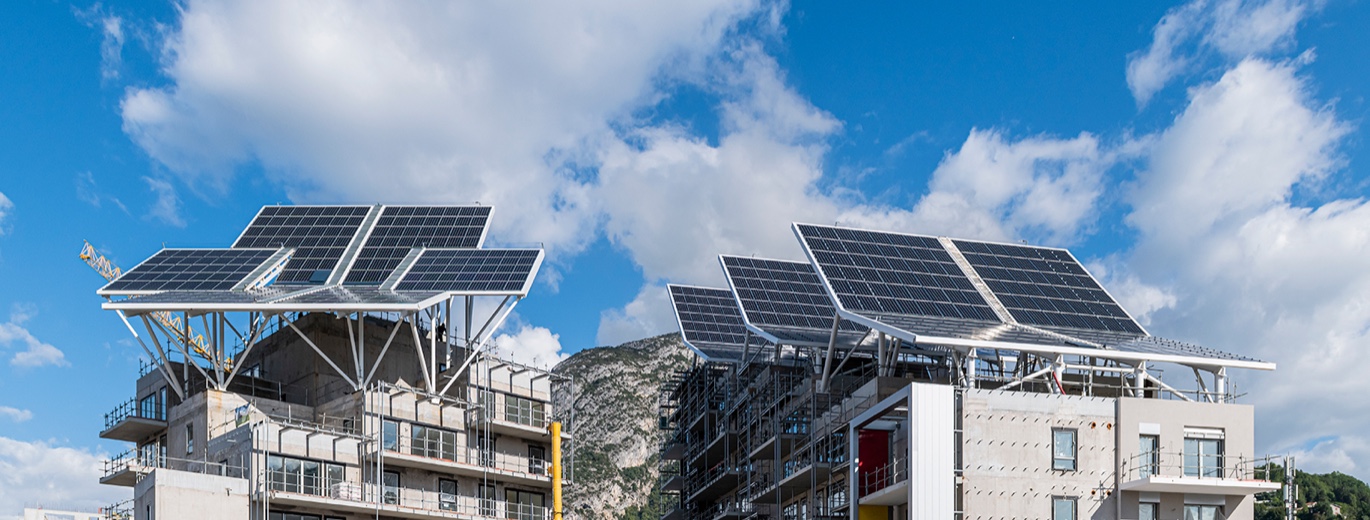
The first autonomous building concept in France
By Grâce Noyal

SUSTAINABILITY
At Grenoble, Bouygues Construction is just finishing its ABC demonstrator, a residential complex designed to be water and energy self-sufficient as well as more comfortable for the people who live in it. Let’s take a look at a project that will help make ecological buildings become reality.
Presqu’île AT GrenoblE
In the new Presqu’île eco-neighbourhood at Grenoble, they are hard to miss. Topped with arrays of 688 solar panels, the two apartment buildings based on the ABC (Autonomous Building for Citizens) concept rise imposingly at the foot of the Chartreuse mountains. The concept is extremely ambitious, and this 62-apartment residence, which is designed to be energy self-sufficient, consume 70% less mains water and optimise waste management, is its first concrete application in France.
ORIGINS IN R&D
The project was conceived by Research and Development teams at Bouygues Construction, under the encouragement of Gaëtan Desruelles then Executive Vice-President, R&D, Innovation and Sustainable Construction. “We were already experimenting with buildings that could produce energy or could manage water more sensibly,” recalls Thierry Juif, Environment and eco-design director at Bouygues Construction. “Gaëtan Desruelles asked us to design a building that would push these concepts to the extreme.” So, the team began to think about how to come up with a building that would meet a list of environmental challenges, as Juif explains: “It would need to produce energy autonomously, use rainwater and recycle wastewater and reduce the quantities of waste produced. It would be built using materials with a low environmental impact. It would also have to be as comfortable for its occupants as a conventional building so that they didn’t have the feeling of taking a step backwards.”
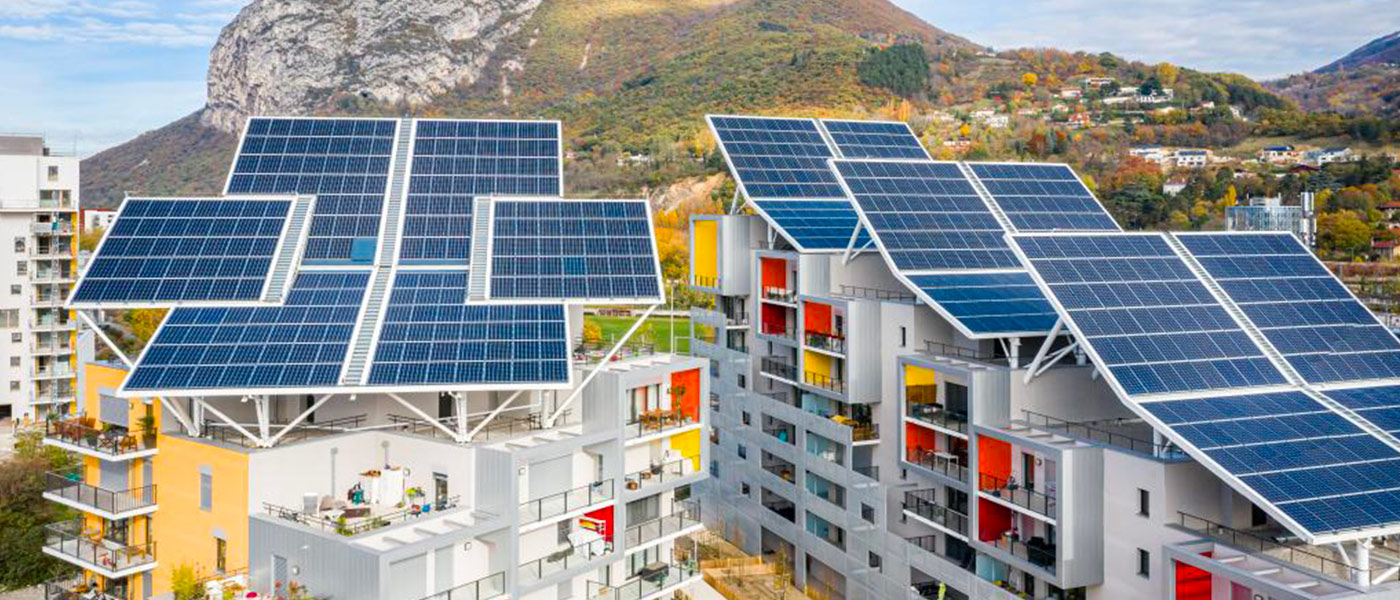
A PROJECT WITH THE
PLANET AT HEART
After several years of research, Bouygues Construction signed an agreement in 2014 with the Municipality of Grenoble to build France’s first ABC demonstrator in the Presqu’île neighbourhood, a government-certified eco-housing development. “We needed a lot of partners to carry out such an ambitious project”, notes Roseline Legrand, Director of Auvergne-Rhône-Alpes region for Linkcity Sud-Est, the property development subsidiary of Bouygues Construction. “Grenoble and its metropolitan area were eager to get on board.”
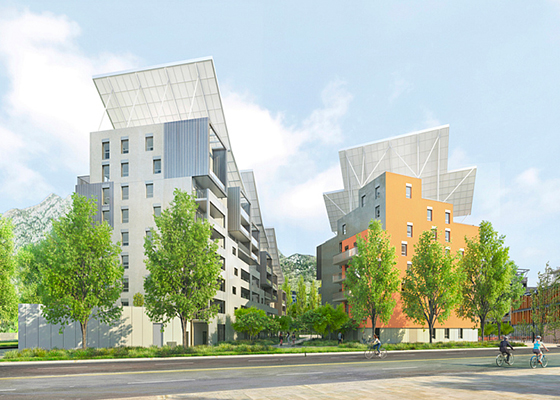
Managing resources and lowering carbon emissions are major issues here in the Alps, where the effects of global warming are being felt twice as fast as elsewhere and in very tangible ways such as shrinking glaciers and more days of high temperatures. The project is also receiving support from the French state through its Investment Programme for the Future and from the Auvergne-Rhône-Alpes regional authority.
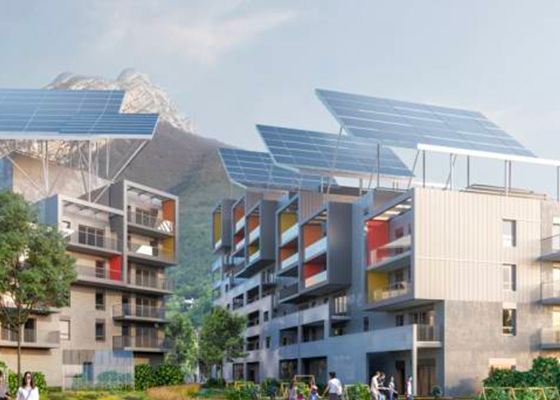
With the ABC residence, we have two aims: to reduce the environmental footprint of the apartments and to reintroduce, in a major city, the collective living spaces and mutual support found in small communities. Thanks to the vision of the R&D teams at Bouygues Construction, the people of Grenoble will be part of this new step towards the home of the future that adapts to its environment.”
CEO, Grenoble Habitat
A SERIES OF INNOVATIONS: FROM ELECTRICITY…
“For the ABC project, we went looking for the best solutions on the market,” says Vincent Joly, the project’s manager at Bouygues Bâtiment Sud-Est. “I’ve never seen so many innovations used in a single project! And, for a housing project, it was a technically very complex worksite.” The electricity will be produced by the 1,130 m² of photovoltaic panels in the solar farm installed on the roofs of the two apartment buildings. Grenoble’s gas and electricity utility GEG ENeR will operate the installation. Electricity will be stored in lithium-ion batteries and redistributed in the mornings and evenings, during peak consumption. The residents of the ABC buildings will have the option of buying the electricity produced by this farm in the first collective own-consumption system in France. The buildings are designed to consume little energy. Each apartment will have double exposure and tight seals around doors and windows. Theoretically, it will not be necessary to use the battery-powered electric radiators for heating. All the apartments will be handed over with a kitchen fitted with low-consumption electrical appliances, and lighting will be provided with energy-saving LED lamps.
…TO WATER MANAGEMENT
Water management is the project’s other big plus. The goal is to cut consumption from the mains water system by two thirds, reducing it to less than 50 litres per person a day. Rainwater running off the solar panels will be recovered, potabilised in an on-site, short-circuit treatment system, and mixed with mains water to re-mineralize it. Wastewater containing organic matter will be treated in a miniature plant installed by Suez on the ground floor and then used for the toilets and watering plants. Even the heat from grey water (i.e. household water containing little pollution) will be recovered with a heat pump and used to produce domestic hot water. The bathrooms will be equipped with recycling showers and shower heads that beam coloured light to indicate in real time how much water has been consumed.
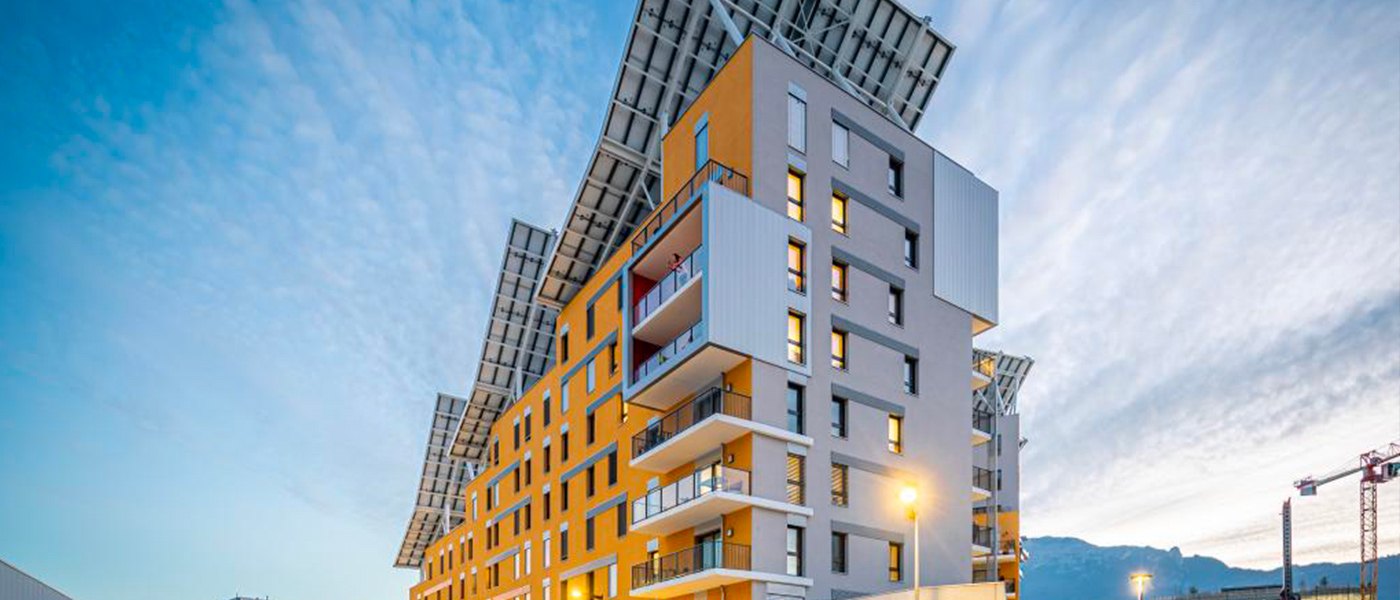
TENANT PARTICIPATION
Another objective of the project is social diversity. A social landlord, Grenoble Habitat, has bought the 62 apartments and will rent them to low and medium-income households so that these innovations are available not just to better-off individuals. The well-being of future tenants is also a prime concern. For example, each apartment will have its own individual and customisable dual-flow air handling units to which special filters like those for pollen can be added. “Another aim is to involve the tenants, get them to change their behaviour, and create a community where people interact with each other,” says Emilie Tourenne, Director of Operations at Linkcity Sud-Est. “We’re seeing a lot of enthusiasm for the project. One hundred or so potential tenants have already visited the show apartments and the information showroom connected to it. Candidates must submit an application, including a questionnaire designed to find out why they are interested. For the project to work, the tenants have to buy into it! That’s why they will be given support by Atelier Pop-Corn, a start-up that will act as a community leader and help everyone learn how their new home works.”
Tenants will be asked to do their part and encouraged to sort their refuse using the bins already provided in the kitchens and a compost pile, to be used for the community vegetable gardens. Also, an app developed in-house by Bouygues Construction will give tenants information in real time about the building’s behaviour and their apartment’s consumption. Hundreds of sensors have been installed to supply data for all these indicators. Bouygues Construction has agreed to monitor the project for five years and assess its environmental impact as well as the residents’ behaviour. At Grenoble, the energy transition is already on the march!
KEY FIGURES
3–
fold reduction in mains water consumption
40%
reduction in residual household waste
70%
self-sufficiency in electricity on a daily basis
107%
of electricity demand covered by the solar farm over one year